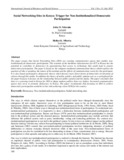Social Networking Sites in Kenya: Trigger for Non-Institutionalized Democratic Participation
Abstract
The paper argues that Social Networking Sites (SNS) are creating communicative spaces that enables non-institutionalized democratic participation. The creation of the backbone infrastructure for ICT in Kenya has the potential to contribute to democracy by guaranteeing that access to technology that would lead to greater democratic participation. The paper is based on the computer-mediated communication theory which explores the question of who is speaking, the nature of the medium and the effects of communication events for the participant. It is also based participatory democratic theory which favours more direct forms of democratic involvement of citizens through the media. In addition the theory of media, politics and public opinion acts as a springboard for the paper because it focuses on the relationship between public opinion and the media. The paper concludes that there is a growing trend in Kenya for SNS to shape modern politics than ever before. Increased communicative spaces may serve to promote democracy in Kenya. The paper recommends that focusing on SNS to achieve democratic participation would be in line with achieving vision 2030 for the country.
URI
https://www.researchgate.net/publication/317844887_Social_Networking_Sites_in_Kenya_Trigger_for_Non-Institutionalized_Democratic_Participationhttp://www.ijbssnet.com/journals/Vol_3_No_13_July_2012/37.pdf
https://www.semanticscholar.org/paper/Social-Networking-Sites-in-Kenya%3A-Trigger-for-Ndavula-Mberia/caf2e690f6db56353bf10f165e5717bb1676ec56
http://hdl.handle.net/123456789/4518

